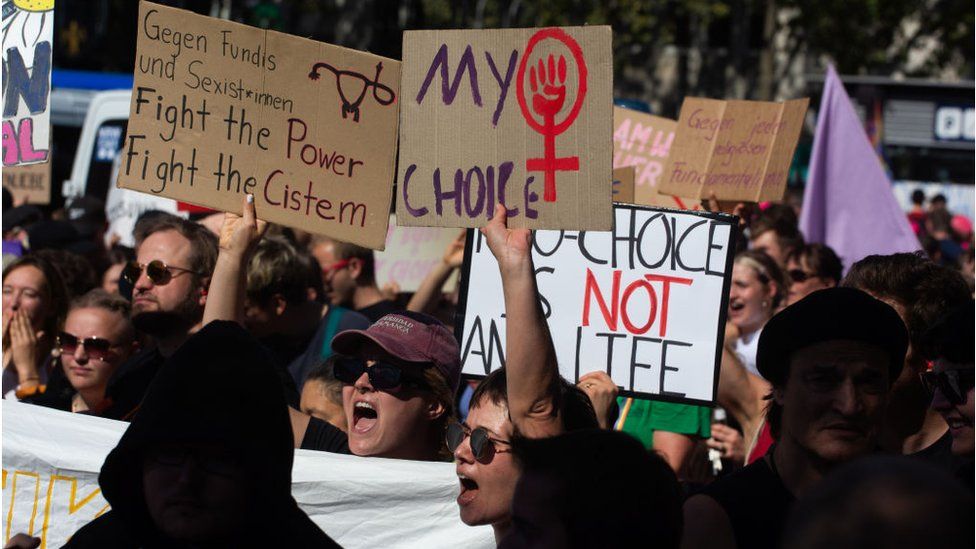ARTICLE AD BOX
 Image source, Getty Images
Image source, Getty Images
Pro-abortion protesters in Cologne last September
By Damien McGuinness
BBC News, Berlin
A government-appointed expert commission has called on Germany country to legalise the termination of a pregnancy within the first 12 weeks.
It might come as a surprise to many, but abortions are, in fact, generally illegal in Germany.
For instance, a woman is not punished for terminating a pregnancy within the first 12 weeks if she has an official medical consultation beforehand.
Other exemptions include cases of rape or when the woman's life is in danger.
In other words, while abortions are in theory illegal, they are generally not prosecuted.
In some cases, charges are pressed against doctors or clinics and women are sometimes questioned by police, which can be traumatic.
The result of this legal limbo is that some clinics and doctors either don't publicise the service on their websites, or refuse to carry out abortions at all out of fear of prosecution. Some women report that provision of terminations can be patchy or hard to find, particularly in rural areas.
Liberalisation campaigners say all this adds to the stigma surrounding abortions, making an already difficult situation unnecessarily stressful for women.
Hurdles, such as finding and organising a pre-termination consolation, mean that abortions are sometimes carried out later.
Women also have to pay for abortions privately. The procedure is not included in the healthcare provided by the expensive compulsory health insurance that all people in Germany have to pay.
To clear up the confusion, a year ago Germany's leftwing-led government set up an independent commission of scientific experts to recommend how to reform the system.
On Monday, they released their 628-page report, recommending that abortions be allowed within the first 12 weeks.
Liane Wörner, a lawyer who leads the commission, said on Monday in Berlin that keeping early-stage abortions illegal is "no longer tenable" given the constitution, human rights and European law.
So will the law on abortions now be liberalised in Germany? Not necessarily.
The government is not obliged to follow the expert commission's advice, and so far ministers have been reticent about sharing their opinion. But opposition conservatives are not holding back, threatening to take the issue to the constitutional court if the law is changed.
The Bavarian conservative CSU party has accused the commission of political bias, saying it is simply delivering the result the government wanted.
Right-wing MPs say the government is launching a culture war over abortion rights, similar to the fierce rows in other countries. "If you want to wage a culture war, then wage it with us," declared parliamentary group leader for the far-right AfD Beatrix von Storch.
The leaders of Chancellor Scholz's centre-left Social Democrat SPD party, meanwhile, have called on right-wingers to avoid polarising and incendiary language. "That doesn't help anyone," said Katja Mast, deputy SPD leader.
Until now Germany has managed mostly to avoid the heated left-right politicisation of abortion rights seen in many countries, such as Poland or the US. At the weekend there were protests from both sides in Munich, but they were small and peaceful.
But all major parties are struggling in the polls, so some politicians may be tempted by the idea of using identity politics to boost flagging support.
National parliamentary elections are due next year. This means it is unlike there will be enough time to change the law on abortion, given the complexities around the issue — but certainly enough time to argue about it, politicise the issue and fire up a culture war.

 9 months ago
29
9 months ago
29








 English (US) ·
English (US) ·